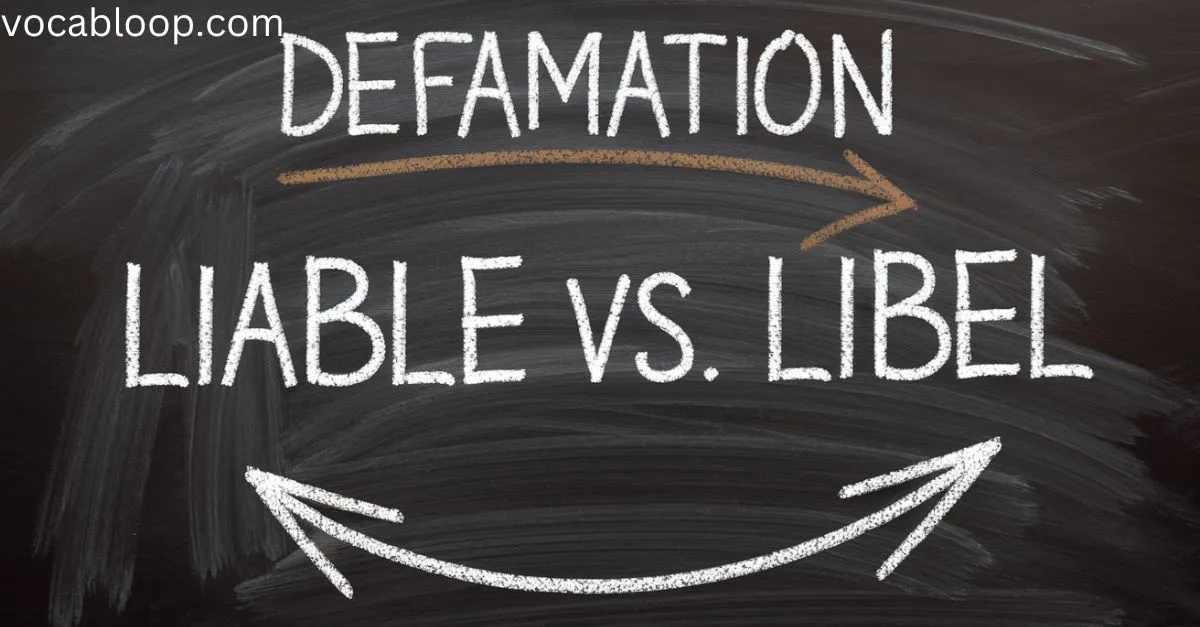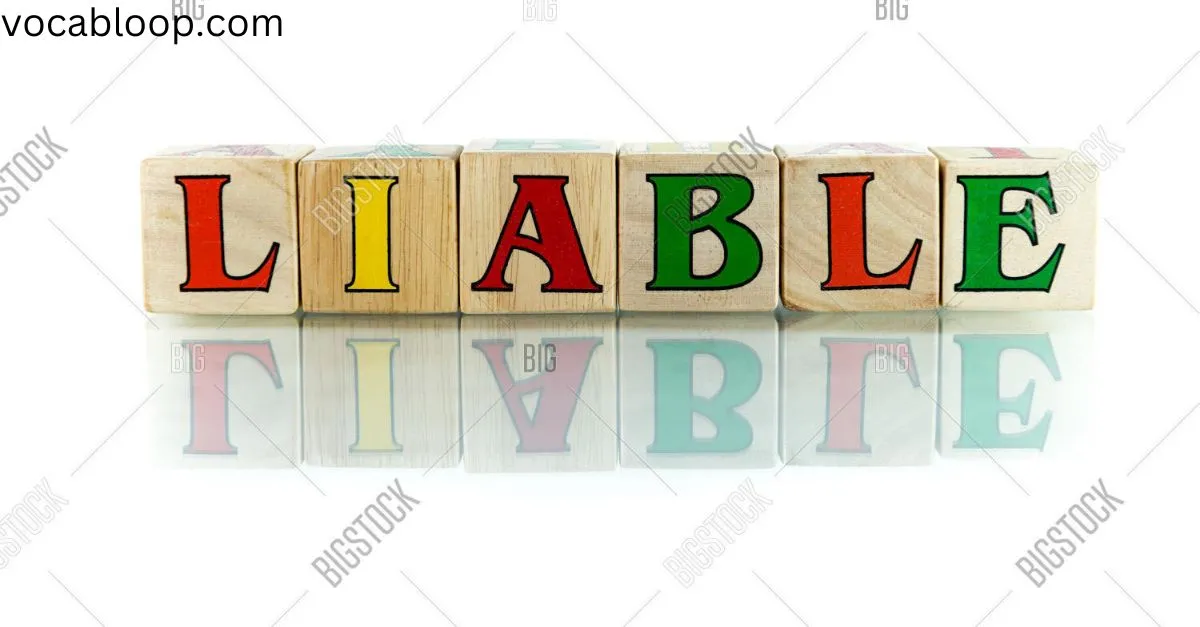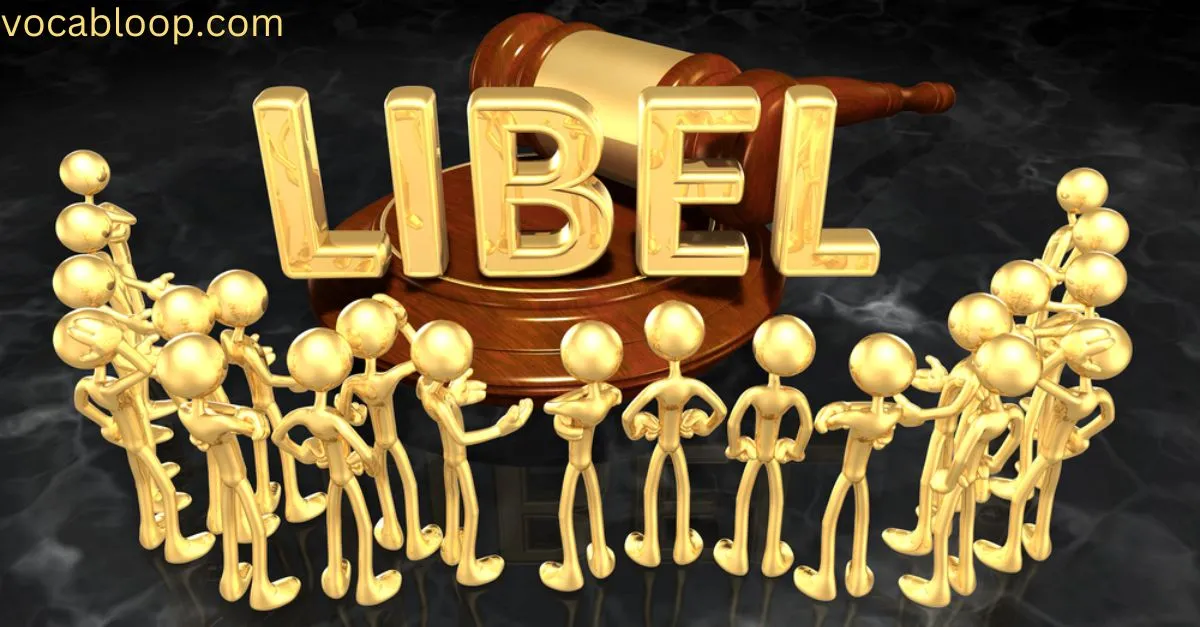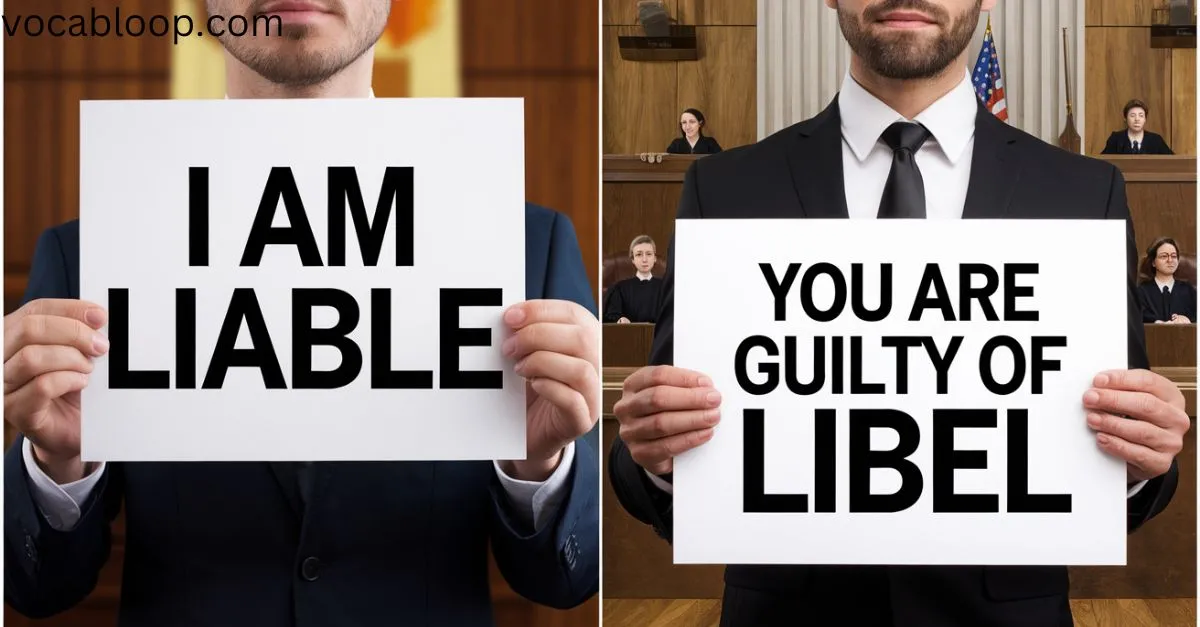Understanding liable vs libel is essential for anyone navigating legal or professional language. Both words appear in contexts like law, media, and everyday conversation, but their meanings differ significantly.
Misusing these terms can cause confusion and, in legal matters, serious consequences. Let’s explore their definitions, usage, and differences in depth.
What Is There Confusion Liable vs Libel?

The confusion between liable vs libel stems from their similar pronunciation and spelling. Both terms sound alike, making them easy to mix up, especially for non-experts in legal terminology. However, their meanings are worlds apart.
“Liable” relates to legal responsibility or obligations, often involving accountability for harm or financial liability. In contrast, “libel” refers to a written defamatory statement that damages someone’s reputation. This difference is critical, especially in fields like journalism, law, and public relations.
What Is Liable?

Is the Word Liable Correct?
Yes, the word “liable” is widely used and correct in the context of legal responsibility or accountability. It refers to being legally bound to compensate for harm or damages caused by one’s actions.
Definition:
“Liable” means being legally responsible or accountable for something, especially in terms of financial compensation or obligations. It is often used in legal settings where a person or entity must answer for damages caused by their actions or negligence.
Meaning:
In everyday terms, “liable” means that someone is likely or obligated to do something, especially under legal circumstances. For example, a person or company can be liable for damages if their actions lead to harm or injury. It is primarily used to describe situations where there is legal accountability for an event or issue.
Usage:
The word “liable” is used when discussing someone’s responsibility in a situation, particularly in legal terms. For instance, a driver who causes an accident can be held liable for the damages. It’s also used in non-legal contexts, such as: “You’re liable to get sick if you don’t bundle up in the cold weather.”
What Is Libel?

Is the Libel Word Correct?
Yes, “libel” is a correct and recognized term in legal language, especially related to defamation in written form. It refers to the act of publishing false, damaging statements about someone.
Definition:
“Libel” refers to the act of making a false and damaging written statement about someone, which harms their reputation. It is typically found in written media, such as newspapers, books, blogs, or social media posts. Libel laws exist to protect people from such defamation.
Meaning:
Libel is a type of written defamation where someone’s reputation is harmed by a false statement. This includes written accusations, untrue reports, or harmful opinions published about someone without proper evidence. It is a legal issue that can lead to serious consequences, such as a defamation lawsuit.
Usage:
Libel is most often used in the context of legal disputes involving written false claims. For example, a celebrity may file a libel case against a news outlet for printing false accusations.
It’s also used in a more general sense to refer to any harmful, written accusations. For example, “The article was accused of libel after it falsely reported the politician’s actions.”
Quick Summary
| Aspect | Liable | Libel |
| Definition | Legal responsibility or accountability | Written defamatory statement |
| Context | Legal or financial obligations | Defamation in written form |
| Example | Liable for damages in a car accident | Publishing false claims in a newspaper |
Liable vs Libel as Parts of Speech
Liable is an adjective describing someone’s legal accountability or likelihood to face consequences. For example, “She is liable for the damages.”
Libel, on the other hand, is a noun referring to a false accusation in writing. For example, “The journalist faced a libel lawsuit.” Knowing the grammatical roles of these terms helps avoid misuse.
Pronunciation of Liable vs Libel
While the words liable and libel may seem similar in spelling, their pronunciations differ slightly. “Liable” is pronounced as /ˈlaɪə.bəl/ (LIE-uh-buhl), emphasizing the “uh” sound between the “L” and “B.” On the other hand, “libel” is pronounced /ˈlaɪ.bəl/ (LIE-buhl), with a more distinct “B” sound following the “L.”
Understanding these small differences can help you avoid confusion when speaking or discussing legal matters. Recognizing these subtle distinctions between liable vs. libel can reduce errors in verbal communication, especially in formal or professional contexts.
Which One Is More Acceptable: Liable vs Libel?
The acceptability of liable and libel is determined by the context in which they are used. If you’re talking about legal responsibility or accountability, such as when discussing financial obligations or legal obligations, “liable” is the correct term. For example, a person or company can be liable for damages if their actions cause harm.
On the other hand, “libel” is used when discussing defamatory written statements that damage someone’s reputation. It’s crucial to use these terms in their proper context to avoid misunderstandings, especially in professional settings. Misusing “liable” and “libel” can lead to confusion, particularly when the conversation involves defamation or legal accountability.
Common Mistakes and How to Avoid Them
One of the most common mistakes people make is confusing liable and libel because they sound so similar. To avoid this, remember that “liable” typically relates to legal responsibility, whether it’s about compensating for damages or fulfilling an obligation. “Libel,” on the other hand, involves written defamation—false statements that harm someone’s reputation. To prevent errors, it’s helpful to think about the context. For instance, if the conversation involves legal responsibility or financial obligations, liable is likely the word you need. If it involves accusations or defamation in written form, libel is the correct choice.
To reinforce the distinction, you can repeat examples in different contexts. For example, “The company was liable for damages in the lawsuit,” versus “The article was accused of libel for spreading false claims.” Additionally, referring to legal dictionaries or style guides when in doubt ensures proper usage and helps build a better understanding of these terms.
Trick to Remember the Difference
A simple memory trick to help you recall the difference between liable and libel. Think of it this way:
- Liable = Lawful Liability: It’s about legal responsibility.
- Libel = Literature Lies: It’s about written defamatory statements.
By associating each term with a specific concept—law for liable and literature for libel—you can more easily remember when to use each word correctly. This trick simplifies the distinction and helps avoid confusion in everyday language or legal discussions.
Origins of Liable vs Libel
Liable
The word liable traces its roots to the Old French term “liable,” which means “bound” or “obligated.” The term was originally used to describe someone who was legally bound to fulfill an obligation or responsibility.
Over time, it evolved into a term signifying legal accountability. Today, the word is commonly used in contexts where someone is held responsible for damages, obligations, or other legal duties, particularly in lawsuits or financial liability situations.
Libel
On the other hand, libel comes from the Latin word “libellus,” meaning “small book” or “written accusation.” During the Middle Ages, the term became associated with written defamatory content. Back then, defamatory statements were often published in pamphlets, books, or other written forms.
Over time, libel laws developed to protect individuals from false and damaging written accusations. Today, the term is used to refer to any false and harmful written statement made about someone, typically leading to a defamation lawsuit.
Synonyms of Liable vs Libel
Liable
- Accountable
- Responsible
- Obligated
- Bound
- Answerable
- Susceptible
- Likely
- Culpable
- At fault
- Blameworthy
Libel
- Defamation
- Slander
- False accusation
- Malicious statement
- Written defamation
- Harmful allegation
- False claim
- Character assassination
- Scandalous publication
- Damaging content
Sentences in Daily Usage Liable vs Libel
Liable
- She’s liable for the car accident damages.
- Businesses are liable for customer safety.
- He’s liable to lose his keys again.
- Companies can be held liable for false advertising.
- You’re liable to catch a cold in this weather.
- The court deemed him liable for negligence.
- We’re liable to pay extra taxes this year.
- Students are liable for maintaining school rules.
- Employees may be liable for contract breaches.
- The landlord is liable for property repairs.
Libel
- The journalist was sued for libel.
- Libel laws protect individuals from false accusations.
- Writing libelous statements can harm reputations.
- A public figure filed a libel case against the magazine.
- Avoid libel by verifying facts before publishing.
- The author faced libel charges for the article.
- Libel often leads to lengthy court battles.
- Social media posts can also constitute libel.
- Misreporting news can result in libel lawsuits.
- The blogger apologized for the libelous claims.
FAQs
What is the main difference between liable vs libel?
The main difference is that “liable” refers to legal responsibility, especially for financial damages, while “libel” refers to false, harmful written statements made to damage someone’s reputation.
How does libel law protect individuals?
Libel law protects individuals by allowing them to seek legal action against false, damaging written statements that harm their reputation.
Can someone be liable for libel?
Yes, someone can be liable for libel if they make false and defamatory written statements about another person, causing harm to their reputation.
What is an example of a written defamatory statement?
An example of a written defamatory statement is falsely accusing someone of a crime in a newspaper article without evidence.
Are libel cases common in journalism?
Yes, libel cases can be common in journalism, especially when journalists or publications publish false and damaging information that harms someone’s reputation.
Conclusion
Liable vs Libel meaning is crucial for clear communication, especially in legal contexts. Whether discussing legal responsibility or tackling issues related to defamation, knowing the difference prevents costly mistakes. Use these terms correctly to avoid confusion and demonstrate precise language skills.

Alex Hormozi is a seasoned blogger at Vocab Loop, known for his deep insights into language, vocabulary, and grammar. With years of experience in writing, Alex shares practical tips and effective strategies to help readers improve their linguistic skills and enhance their writing abilities.

